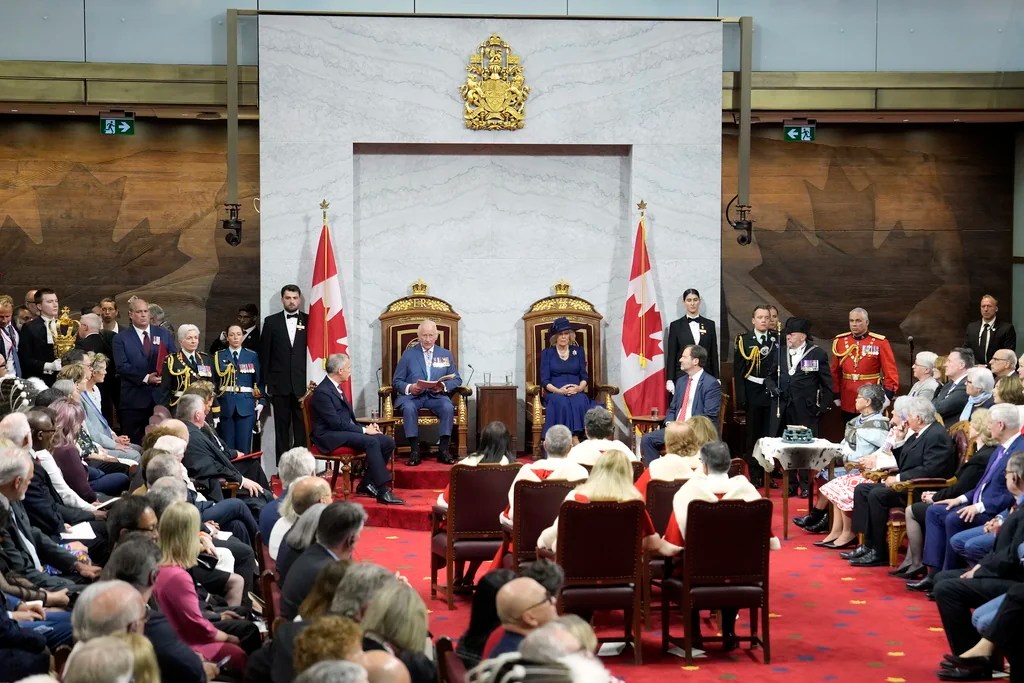King Charles III is making sure former royal subjects in Washington, D.C., remember that he still owns the place while in Ottawa.
Charles opened the Canadian Parliament as monarch for the first time on Tuesday in a display of national sovereignty against the U.S. government. The king’s speech clearly rebuked the White House’s aspirations to annex its northern neighbor, but he stopped short of fanning flames.
The king arrived at the Canadian Senate in a horse-drawn carriage driven by red-uniformed mounties, and stood in front of saluting servicemen as the national anthem, “O Canada,” was performed. Crowds gathered outside chanted “God save the King!”
Canadian Prime Minister Mark Carney invited the king to open the legislature as a direct response to U.S. President Donald Trump, who has repeatedly voiced his desire to annex Canada and make it the “51st state.”
Buckingham Palace undoubtedly saw the opportunity as an important avenue for bolstering royalist attitudes in an egalitarian nation that has recently become less enthusiastic about its monarchical roots.
The resulting speech celebrated “Canadians coming together in a renewed sense of national pride, unity, and hope” under the crown and sought to encourage national self-confidence.
“The crown has for so long been a symbol of unity for Canada. It also represents stability and continuity from the past to the present. As it should, it stands proudly as a symbol of Canada today, in all her richness and dynamism,” Charles told the Canadian Parliament. “As the anthem reminds us: The True North is indeed strong and free!”

Traditionally, the monarch does not prepare his own speech but is instead given one to read by the Canadian government. The speech can be lightly amended or edited to reflect the sovereign’s priorities and perspective.
It was a unique opportunity for Carney and his Cabinet to use the monarch as an even-tempered, detached mouthpiece for rhetoric that might be deemed too passive after months of feuding with the White House.
“We didn’t ask for this fight, but Canadians are always ready when someone else drops the gloves,” Carney told his supporters at a rally in April. “In this trade war, just like in hockey, we will win.”
Many expected a speech saturated with this righteous indignation, but Charles delivered a more docile address that noted Canadians’ “anxiety” about their nation’s future and called on them to act unselfishly.
“We owe it to this generation, and those who succeed us, to think and act for the greater good of all,” Charles told the nation in his opening. “While the world faces unprecedented challenges, generating uncertainties across the continents with regards to peace and stability, economics, and climate change, your communities have the skills and determination to bring a wealth of solutions.”

“Many Canadians are feeling anxious and worried about the drastically changing world around them,” Charles continued. “Fundamental change is always unsettling. Yet this moment is also an incredible opportunity. An opportunity for renewal. An opportunity to think big and to act bigger. An opportunity for Canada to embark on the largest transformation of its economy since the Second World War.”
He made one veiled comment on Trump that was impossible to ignore: “Today, Canada faces another critical moment. Democracy, pluralism, the rule of law, self-determination, and freedom are values which Canadians hold dear, and ones which the Government is determined to protect.”
However, while the speech repeatedly referenced foreign threats to economic stability and a changing international order, Charles made only one direct reference to Trump — and it was ostensibly positive.
“The Prime Minister and the President of the United States … have begun defining a new economic and security relationship between Canada and the U.S., rooted in mutual respect and founded on common interests, to deliver transformational benefits for both sovereign nations,” he said.
CANADA ALREADY HAS A KING: IT ISN’T DONALD TRUMP, BUT CANADIANS STILL AREN’T THRILLED ABOUT IT
Charles urged Canadians to be “confident” and seize opportunities to gain “far more than any foreign power on any continent can ever take away.”

Charles’s invitation was a strategic diplomatic decision, given Trump’s public praise for the royal family.
During his reelection campaign, Trump scolded former President Joe Biden for not attending the king and queen consort’s coronation. Trump called the pair “two very special people” and wished them a “long and glorious” reign. He also gushed about “how handsome” Prince William looked at the reopening of Notre Dame.
Even first lady Melania Trump has expressed affection for the monarch. Having met the royals multiple times over the years, she revealed in her memoir that she “exchanges letters with King Charles to this day.”
